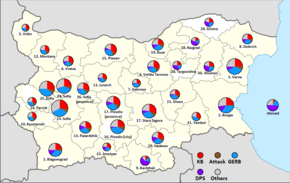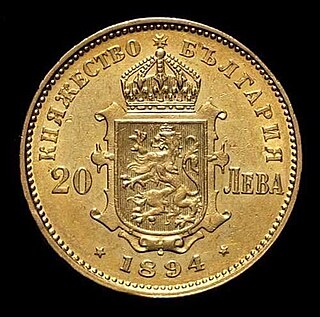
The Bulgarian Socialist Party, known as the Centenarian, is a social-democratic political party in Bulgaria and the successor to the Bulgarian Communist Party. It is a member of the Party of European Socialists with a pro-EU stance, although it has taken some euroskeptic positions and called for an end to EU sanctions against Russia. BSP is also a member of the Socialist International. It is Bulgaria's largest political party by membership.

The Movement for Rights and Freedoms is a centrist political party in Bulgaria.
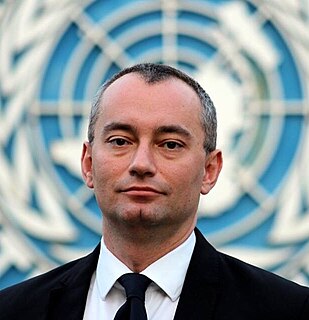
Bulgaria elected its members of the European Parliament in a by-election on 20 May 2007. It was the country's first European election, having joined the Union on 1 January of that year. The country still had 18 MEPs, no change from before the election. Until Bulgaria could hold these elections, the country was represented by MEPs appointed by the National Assembly.

Parliamentary elections were held in Bulgaria on 5 July 2009. With 40% of the vote, the decisive winner of the elections was the established in 2006 personalistic party of Boyko Borisov - GERB. The Socialist Party, in power before the election, was in second place, with around 18%. Оnce-ruling National Movement Simeon II did not cross the 4% threshold and won no seats. The turnout was 60.2%, one of the lowest ever. Following the election, GERB leader Boyko Borisov became Prime Minister. Just like all the previous parliamentary elections since the fall of communism, the government was not re-elected.

Vezhdi Letif Rashidov is a Bulgarian sculptor, GERB politician and was a Minister of Culture of Bulgaria.

Tsetska Tsacheva Dangovska is a Bulgarian jurist and GERB politician who is the current Minister of Justice of Bulgaria as part of the Third Borisov Government, having assumed office on 4 May 2017. She had previously held the position of Chairwoman of the National Assembly of Bulgaria on two occasions. Tsetska Tsacheva is the first woman to ever chair the National Assembly of Bulgaria since its establishment in 1878.

The 2011 Bulgaria antiziganist protests started during the night of 23 to 24 September 2011 in the village Katunitsa and later spread to other locations all over the country, including Plovdiv, Sofia, Varna, Burgas, Pleven, Ruse, Pazardzhik, Stara Zagora and others. The reason for the unrest was the murder of local youth, who was run over by car by close associate of local roma boss Kiril Rashkov. These protests were accompanied with racist chants and called for violence against Romani. The riots in Katunitsa led to the burning of two cars and four houses, owned by different members of the family of the alleged Romani crime boss Kiril Rashkov, also known as "Tsar Kiro". The United Nations and the OSCE condemned the demonstrations and the violence.

Plamen Vasilev Oresharski is a Bulgarian politician who served as Prime Minister of Bulgaria from 2013 to 2014. Previously Oresharski was Minister of Finance from 2005 to 2009 in the Cabinet of the Triple Coalition with Prime Minister Sergei Stanishev.
The 2013–14 Bulgarian protests against the Oresharski cabinet are series of demonstrations that were held in Bulgaria, mainly in the capital Sofia, against the left-wing coalition cabinet of Oresharski. The demonstrations started on 28 May 2013, but actual large-scale protests did not emerge until 14 June.
While the trigger factor for the demonstrations was the controversial appointment of Delyan Peevski as head of DANS in June 2013, the public discontent stemmed from a variety of causes, to a large extent connected to the general nature of the BSP-MRF governing coalition and perceived legitimacy issues surrounding political processes in Bulgaria. They ended in July 2014 with the resignation of the Oresharski government. The protests have been described as being among the most massive in Bulgaria's recent history.
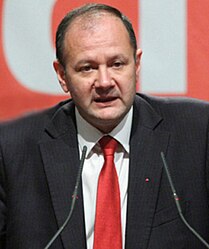
Mihail Raykov Mikov is a Bulgarian politician who was Chairman of the Bulgarian Socialist Party (BSP) from 2014 to 2016. He is a parliamentarian with six consecutive terms as a deputy in the National Assembly. His career in the legislature culminated in his election as Chairman of the 42nd National Assembly on May 21, 2013. Mikov was Minister of Interior from 24 April 2008 to 29 July 2009 in Sergei Stanishev's government. Currently he is the leader of the Parliamentary Group of BSP Left Bulgaria in the 43rd National Assembly, the coalition led by the socialist party. Mihail Mikov was elected as Chairman of the BSP on 27 July 2014, succeeding Sergei Stanishev. He won a run-off against outgoing Economy and Energy Minister Dragomir Stoynev with a final tally of 377-333.

Parliamentary elections were held in Bulgaria on 5 October 2014 to elect the 43rd National Assembly. GERB remained the largest party, winning 84 of the 240 seats with around a third of the vote. A total of eight parties won seats, the first time since the beginning of democratic elections in 1990 that more than seven parties entered parliament. Boyko Borisov then became prime minister as head of a coalition with the Reformist Bloc and with outside support from the Patriotic Front and the Alternative for Bulgarian Revival.
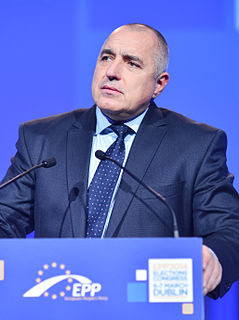
The ninety-first Cabinet of Bulgaria took office on November 7, 2014. It is a coalition government chaired by Boyko Borisov. The government was formed after the Borisov's party, GERB, won the 2014 parliamentary election. As GERB won 84 out of the 240 seats in the National Assembly, they were compelled to form a coalition to legally govern.
Tatyana Doncheva Toteva is a Bulgarian politician from the PP "Movement 21", of which she is the chairperson. She has been a member of three National Parliaments.

Presidential elections were held in Bulgaria on 6 November 2016, alongside a referendum on changes to the electoral system and political party funding. The second round was held on 13 November 2016, resulting in the victory of Rumen Radev.
Revival is a political party in Bulgaria, founded in August 2014 its chairman is Kostadin Kostadinov.

The ninety-third Cabinet of Bulgaria took office on May 4, 2017. It is a coalition government that is chaired by Boyko Borisov. The government was formed after the Borisov's party, GERB, won the 2017 parliamentary election. However, GERB won only 95 out of 240 seats in the National Assembly and therefore needed to form a coalition in order to govern.






